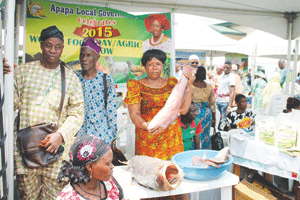In commemoration of the World Food Day penultimate Friday, African nations were the focal point of poverty and hunger which continue to ravage the people. This, according to Senior Correspondent, ONYEWUCHI OJINNAKA, is because investment in agriculture and food production has been taken for granted by various nations in the continent.
As the international community marked the 35th anniversary of World Food Day (WFD), on Friday, October 16, the United Nations Secretary-General, Mr. Ban Ki-moon; the Director-General of Food and Agriculture Organisation (FAO), Jose Graziano da Silva; the President of Italy and other dignitaries gathered in Italy to commemorate the occasion.
WFD was celebrated all over the world and the major purpose was to raise awareness on the way forward for eradication of poverty and hunger around the globe.
In 1979 at the FAO’s general conference, WFD was established when the former Hungarian minister for food and agriculture suggested the idea. In creating awareness and making efforts to end hunger, FAO encourages discussions that centre on agriculture and revolves round education and health. The organisation hopes that by creating awareness, especially around agriculture, more investments would be made in the sector.
More importantly, the UN noted that agriculture, which is the mainstay of the economies of most developing countries, has not had sufficient foreign investment over the years. This development could be said to be responsible for about 800 million people that still go to bed hungry in Africa where the agriculture sector contributes over 25 per cent to its Gross Domestic Product (GDP).
To address the problem of hunger, the UN established the Millennium Development Goals (MDGs) in 2000. Topping the list of the goals by world leaders is the eradication of extreme hunger and poverty. It was proposed that by 2015, all the 193 member nations would have been able to reduce the proportion of people living on less than $1.25 per day and perhaps reduce the proportion of people suffering from hunger and malnutrition by half.
At the recent UN summit, the General Assembly adopted 17 Sustainable Development Goals (SDGs). Further, the World Bank set a new poverty line at $1.90 to reflect the rise in the global inflation rate.
Poverty level in Africa
According to the UN, in 2010, out of its 54 African member nations, only Nigeria and Congo were still living in acute hunger and poverty. However, in a recent report by FAO, three African countries have the highest percentage of undernourished people in the world. The countries are Zambia, Central African Republic (CAR) and Namibia.
Despite the reported investor surge in Zambia, the country ranks the second highest on the list of the hungriest people in the world with over seven million malnourished people. As copper is the pillar of the Zambian economy, agriculture is still very much at its subsistence level.
In CAR, over 40 per cent of the entire population is suffering from hunger, poverty or undernourished. Ranked as the 45th largest country in the world, CAR earns about $400 in a year as per capita income which is one of the lowest in the world poor economic development, and ongoing crises in the landlocked region may be the possible cause of hunger.
In Namibia, with a population of 2.1 million, about one million people are hungry. Almost half of the population depends on agriculture.
WFD in Nigeria
Commemorating the WFD in Lagos State, the governor, Akinwunmi Ambode, assured the people of Lagos that his administration would create a conducive environment for the citizens to have physical and economic access to sufficient, safe and nutritious food to maintain a healthy life.
In his message delivered on his behalf by the permanent secretary in the state’s Ministry of Agriculture, Dr. Olajide Basorun, the governor said the theme of this year’s WFD, which is ‘Social Protection and Agriculture: Breaking the Cycle of Rural Poverty’, is a clarion call to government and the people to synergise and ensure food security for all.
Ambode said: “We have to synergise and work together. Government will provide the necessary infrastructure and policies to enhance food security by encouraging more people to be involved in the process of subsistence farming.”
He also said that consumption pattern in Lagos was expected to triple within a decade, stressing that there was no better time than now for all citizens and stakeholders to engage in farming.
“Already, we have put in place structures that would encourage our children to acquire basic knowledge about integrated farming skills and contribute their quota to the food basket of Lagos State,” he revealed.
Also speaking on the WFD, the public relation officer of Nutrition Society of Nigeria (NSN), Mr. Ochuko Erinkainwe, stressed that emphasis on WFD should focus on eating right for healthy living as “food is healing”.
Erinkainwe, a food technologist, emphasised the importance of eating enough vegetables, saying that it is the only natural food that helps to fight diseases. He posits that taking enough vegetables helps to fight and eliminate cancer.
According to him, researchers have proved beyond doubt that people who eat more natural plant foods like vegetables, fruits and legumes are less likely to be diagnosed with cancer in their lifetime.
“Our daily meals count a lot when it comes to cancer risk factors. What we eat determines how much immunity we have in our body and also building resistant fluids inside the system,” he stated.
“If we want to build or design an anti-cancer diet, then we should look at adding much vegetables to our meals. We should eat plenty vegetables every day.”
WFD was commemorated in many states of the federation, particularly in Asaba, Delta State, and Ado-Ekiti in Ekiti State. The focus was food production, food processing, storage and security for Nigerians. The occasion was used to call on federal and state governments to invest more in agriculture, empower farmers, encourage youths to be actively involved in farming and create employment by subsidising agriculture.
Various governments were asked to motivate the farmers and youths to venture into farming. There should be no discrimination in the distribution of agricultural materials and products. They should enhance food production by empowering the local farmers, ensure equitable distribution of fertilisers, agricultural loans and other incentives.
Based on that, the Ekiti government stated that it is prepared to partner with investors on agriculture.
Investing in food production
While marking the WFD, stakeholders in the agriculture sector tasked the federal government to invest more in the sector for increased food production and direct access to food.
The national technical adviser of All Farmers Association of Nigeria (AFAN), Dr. Tunde Arosanyin, posited that in recent times most of the world’s poor and hungry people belong to rural families who depended on agriculture for their daily livelihood.
“Government needs to invest heavily in agriculture by increasing its budget from the current eight per cent to at least 20 per cent to make food available for rural dwellers.
“Presently, the vacuum created in agricultural practice in the nation has led to social security challenges all over the country such as the Boko Haram problem, kidnapping and cattle rustling,” he said.
He added that the challenges need to be addressed to enable the farmers to perform.
“You do not expect farmers to be in the farm while they are being attacked on a daily basis,” Arosanyin stressed.
He chided the federal government on poor agricultural policies and made reference to Operation Feed the Nation (OFN) of 1977 by then military head of state, Olusegun Obasanjo. The programme was adjudged a failure because it was not properly articulated.
According to him, the programme intended to make agriculture a profitable business venture and not only to make the nation food sufficient but also tackle the challenges of youth unemployment.
“The policy also encouraged farmers from all stages of production through extension services, and if a farmer does not have a competitive market to sell after producing, the river basin authorities were on the ground to buy. They bought from farmers at market price which encouraged production to be totally complete and this led to good harvest.
“If federal government buys into these ideas, I am sure agriculture can create job to about 40 million people,” he posited.
Also in his message, AFAN chairman in Kwara State, David Ajiboye, frowned at the manual system of agriculture in the country which discouraged a lot of youths taking agriculture as business. He used the occasion to call on the government to discard the age-long hoes and cutlasses and make farming interesting by introducing and encouraging mechanical farming which will in turn produce mass farming outputs.
Factors affecting agriculture
Propcorn Mac-Karifi, an innovative market-driven outfit funded by the United Kingdom Department for International Development (DfID) which aims to reduce poverty in Nigeria, stated that over 60 per cent of Nigerians rely on agriculture for livelihood, but many of these farmers continue to cultivate and produce at a loss due to a number of factors, and Nigeria continues to import to meet the demands of its increasing population.
According to Propcorn, “Working with our partners, we bridge the gaps which impede small holder farmers from maximising their production potential. These include farmers’ access to vital inputs like high quality seeds, fertilisers, crop protection products, extension agents, mechanisation, and storage facilities and to buyers for their produce.
The UK-funded organisation stated that as a result of its programme, more than 422,000 poor farmers and social entrepreneurs in the northern part of the country have earned over a total of N627 million as additional income.














